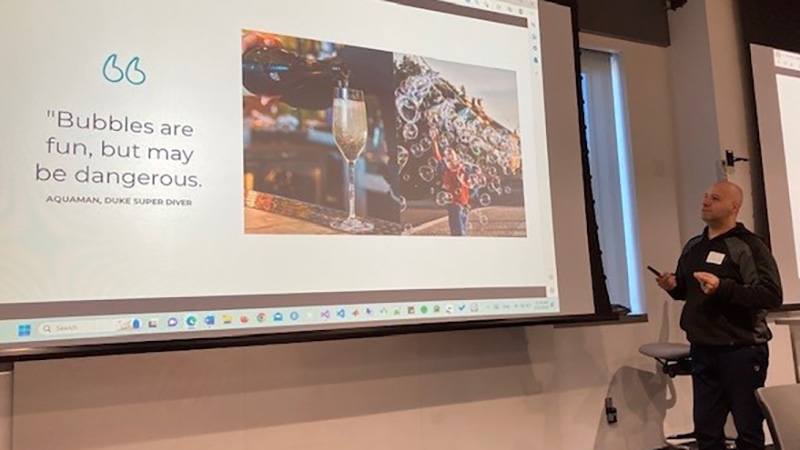Helping Duke Engineers Share Their Stories
By Ken Kingery
New programming in Duke Engineering’s Graduate Communications and Intercultural Programs focuses on science communications

A full room listened as PhD students presented snapshots of their research: analyzing the behavior of Parkinson’s patients using AI, calculating the perfect diving ascent in real-time without getting the bends, controlling a swarm of unstable drones while they complete their mission.
They weren’t, however, talking to a room full of potential investors or funding agencies. Nor were they trying to recruit new doctoral students into their laboratories.
But they could have been.
“It’s really hard for PhD students to take their highly technical work and make it understandable to everyday people, but it’s an extremely important skill for them to practice,” said Marcie Pachino, an assistant adjunct professor in Duke Engineering’s Graduate Communications and Intercultural Programs. “We’re working to make this kind of training widely accessible to all graduate students within the school.”
“It’s really hard for PhD students to take their highly technical work and make it understandable to everyday people. But, it’s an extremely important skill for them to practice. We’re working to make this kind of training widely accessible to all graduate students within the school.”
marcie pachino | Duke Engineering Graduate Communications and Intercultural Programs
The presentations were the culmination of a three-day workshop that took place over spring break this year. In feeling out the new pilot program, Pachino and her colleague Angus Bowers, also an assistant adjunct professor in the office, invited 10 doctoral students for two half-days and one full day of science communications training.
Students learned to consider the audience they’re speaking to in various situations, how storytelling plays an integral role in keeping listeners engaged. After lots of activities and practice, each came away with a rough draft for a five-minute presentation about their research targeted at a specific audience, such as potential investors or a classroom full of elementary school students.

The pilot was a hit, and Pachino plans on offering a similar version of the class for credit this coming fall semester.
“We were very pleased. The students that came were engaged from the get-go,” Pachino said. “While they struggled a little at first, especially when trying to come up with ways to explain their work to a 13-year-old, they eventually found analogies and examples to help them out, and they all came away with an incredibly useful skill.”
Science communications is a relatively new pursuit of Graduate Communications and Intercultural Programs, spearheaded by its director, Sue Mathias. But it’s far from the office’s only offerings.
“Conveying complex research to nonexperts is an extremely valuable skill. We’re excited about the new courses and anticipate a strong demand from our students.”
aaron franklin | associate dean for doctoral education
The department was started in 2018, with Pachino as one of its first hires. A Duke graduate herself, Pachino taught English as a second language in Durham Public Schools for nearly 30 years. That experience helps her work one-on-one with graduate students for communications needs and with groups by leading academic and professional writing courses.
While the department is sometimes thought of as a tool primarily for graduate students who do not speak English as their first language, it’s a valuable resource for everybody in Duke Engineering. Whether working on academic presentations or learning to construct the various sections of an academic paper, the Graduate Communications Center offers a variety of services.
And now they can add science communications to their list.
“Conveying complex research to non-experts is an extremely valuable skill for any of our students to practice,” said Aaron Franklin, the Addy Professor of Electrical and Computer Engineering and associate dean for doctoral education. “We’re excited about the new courses the department is creating and anticipate a strong demand from our students.”
